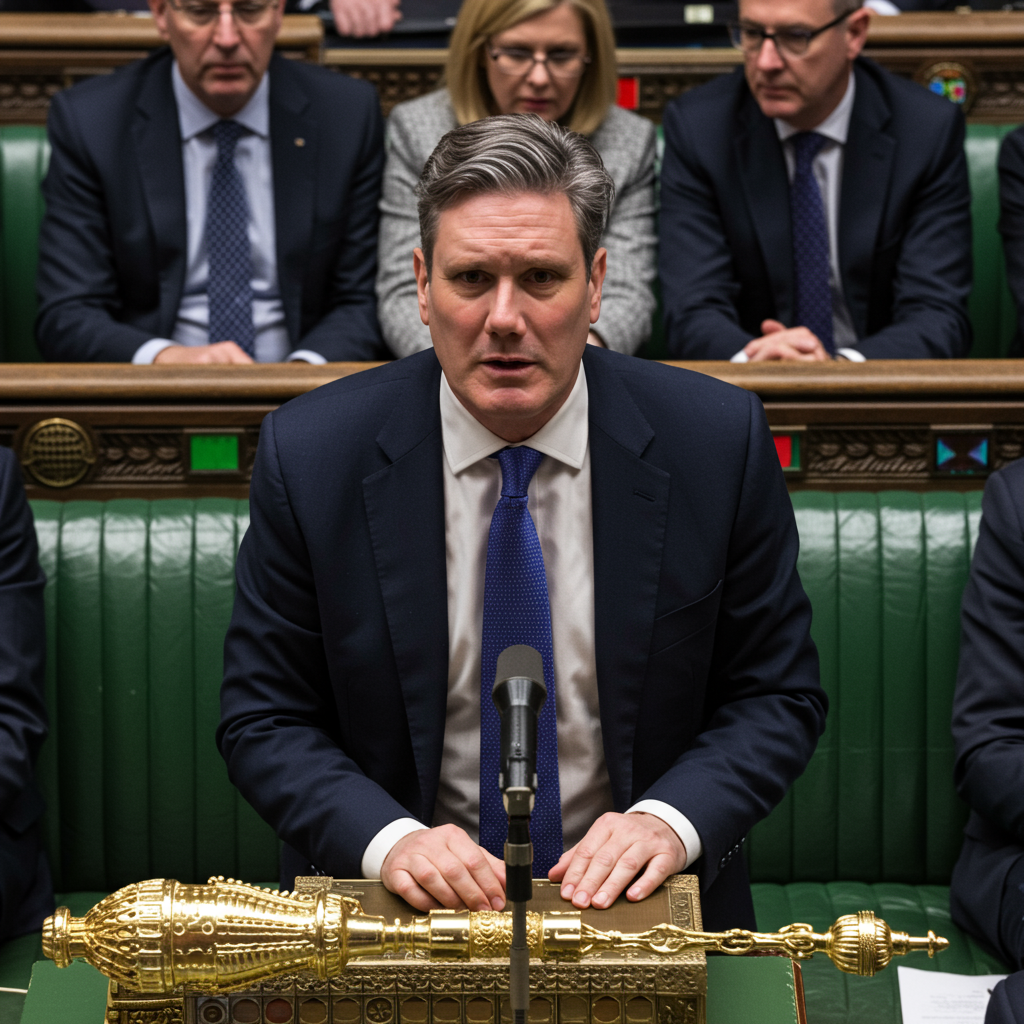A significant political setback struck Prime Minister Keir Starmer recently, marked by chaotic scenes in the House of Commons during a crucial vote on welfare reforms. The situation unfolded with a sense of slow-motion crisis, culminating in what many observers have described as a profound humiliation for the government leader. This episode felt extraordinary, drawing parallels, albeit with stark differences, to the tumultuous parliamentary moments seen during the Brexit deadlock or the challenging periods faced by former prime ministers like Boris Johnson and Liz Truss. Unlike those instances where leaders often lacked clear mandates or secure majorities, Starmer navigated this crisis despite having both electoral backing and a solid parliamentary majority, underscoring the internal challenges he faced.
The core of the turmoil centered on proposed changes to the eligibility criteria for the Personal Independence Payment (PIP), a key disability benefit. The government had intended to implement these alterations in November of the following year. However, the proposal triggered widespread alarm and opposition, particularly from a substantial number of MPs within Starmer’s own labour party. This internal resistance quickly escalated into a major challenge to the government’s authority and control over the legislative agenda.
Navigating the Political Storm: A Timeline of Tumult
The crisis began unfolding rapidly as concerns grew among backbench Labour MPs regarding the potential impact of the planned PIP eligibility changes. Downing Street appeared slow to grasp the depth and breadth of the brewing discontent within its own ranks. Initially, signals of potential rebellion were seemingly underestimated, leading to a series of reactive measures rather than proactive management.
The first major concession came in the early hours of the Friday preceding the main vote. Faced with significant internal opposition, the government executed a “massive U-turn number one.” The timing of this climbdown, happening well past midnight, suggested a hastily assembled response to an immediate threat of rebellion. Insiders noted this pointed to the speed at which the government was forced to shift its position under pressure from its own party members.
Hopes Dashed: Continued Opposition and Escalation
Following the initial U-turn, the government reportedly hoped that its concessions would be sufficient to quell the rebellion. However, it soon became apparent that a determined and persistent group of Labour MPs, estimated to be around 50, remained unwilling to back the government’s revised position on the welfare changes. This group’s steadfast opposition posed a significant challenge, even if the government initially believed it could manage the situation.
Attempts by the government to reassure its MPs proved counterproductive. On Monday, details were presented to the Commons in an effort to clarify the concessions made. Instead, this move only seemed to worsen the situation. It reportedly sowed further uncertainty among wavering MPs regarding the specifics of the proposed changes and the government’s true intentions. The effort to build support inadvertently created more confusion and solidified resistance among some members of the parliamentary party.
By Monday night, the gravity of the situation was becoming clear to those closely monitoring the internal dynamics. Whispers from the whipping operation suggested the scenario was “touch and go,” indicating that the government’s ability to secure a majority in the upcoming vote was far from certain. The anxiety among senior Labour figures was palpable by Tuesday morning, their furrowed brows reflecting the heightened concern at the top of government.
The Brink of Defeat: A Second Climbdown
Despite the clear signs of trouble, Work and Pensions Secretary Liz Kendall initially returned to the Commons and reiterated the government’s intention to proceed with changing the PIP eligibility criteria the following November. This public stance highlighted the government’s initial determination, even as the situation internally deteriorated.
However, as the day progressed, the threat of a major parliamentary defeat became more imminent. Deputy Prime Minister Angela Rayner reportedly engaged in frantic phone calls, attempting to persuade reluctant Labour MPs to support the government. Word reaching Downing Street suggested the potential number of rebels was increasing dramatically, possibly reaching 75 or even 80. This figure was dangerously close to the number required to defeat the proposed welfare reforms in the House of Commons.
Facing the real prospect of losing the vote, Prime Minister Starmer had few alternatives. A second U-turn was swiftly sanctioned. This effectively stripped away the central pillars of the welfare reform plans that had been official government policy just a week prior, leaving the proposals appearing significantly weakened or “threadbare.”
The task of announcing this latest reversal fell to Work and Pensions Minister Sir Stephen Timms. He informed the Commons of the government’s decision to concede further to the demands of dissenting MPs. This second major policy shift in less than a week underscored the extent to which the government had lost control of the parliamentary situation.
Fallout and Fractures Within the Party
The government’s decision to implement a second U-turn, while averting immediate defeat, did not resolve the underlying tensions within the Labour party. Instead, it provoked strong reactions from various factions. Many would-be rebels, who had pushed for greater concessions or opposed the principle of the changes entirely, expressed fury at what they perceived as a “shambles” in the government’s handling of the issue.
Equally frustrated were the Labour MPs who had remained loyal throughout the week, consistently backing the government’s evolving positions. These loyalists found themselves in the awkward and frustrating position of having been asked to endorse three different stances on the welfare reforms in less than seven days. The rapid shifts undermined their positions and made them feel exposed. Sharp quotes from MPs circulated, with some reportedly calling the situation “Jokers” and describing the experience as a “Nightmare.”
The episode also exposed underlying tensions between government officials and certain segments of the parliamentary party, particularly newer MPs. Some officials reportedly displayed open contempt, suggesting that the 2024 intake of MPs misunderstood the nature of their role, implying they were overly idealistic or entitled based on their recent election victories. This sentiment highlighted a potential disconnect between the party leadership and its newest parliamentary members.
Wider Implications and Leadership Scrutiny
The political fallout from this vote defeat and the manner in which it unfolded is significant and carries potentially “head-spinning” implications for Keir Starmer’s government. Political analysts are already speculating on the consequences. Many now believe that tax rises in the upcoming autumn budget are increasingly “inevitable” as the government seeks ways to manage public finances following concessions or policy shifts.
The episode has also led to questioning within Labour circles at all levels regarding the future of key personnel. The positions of figures like Chancellor Rachel Reeves and Work and Pensions Secretary Liz Kendall have come under scrutiny. While Kendall has publicly stated her desire to continue in her role, the controversy surrounding the welfare proposals has put her position in the spotlight. A senior government source was also quoted as suggesting that a previously considered plan to lift the controversial two-child benefit cap in the autumn may no longer be feasible following this political setback, highlighting potential policy casualties of the crisis.
This event occurs against a backdrop of existing criticisms regarding Keir Starmer’s leadership approach since becoming Prime Minister. Some critics point to a perceived shift away from traditionally progressive Labour policies, including debates around NHS privatization, the stance on immigration enforcement, and a ‘tough-on-crime’ agenda. There have also been internal party tensions related to the handling of the left-wing faction, including the decision to remove the whip from MPs who voted against measures like the two-child benefit cap. These criticisms, reported in various outlets, contribute to a narrative among some observers that Starmer is moving the party too far to the right or struggling to maintain unity across Labour’s diverse political spectrum, potentially offering context for why rebellion occurred despite his parliamentary majority. Furthermore, analysis of the 2024 election result suggests Starmer’s victory was heavily influenced by the collapse of the Conservative vote and the rise of Reform UK, rather than a significant increase in Labour’s popular vote share compared to 2019, potentially indicating a less robust personal mandate than the large majority suggests.
The atmosphere within Downing Street itself was reportedly poor following this episode, exacerbated by recent interviews given by the Prime Minister marking his first anniversary in office. Some senior figures reportedly interpreted these interviews as a repudiation of the government’s existing strategy and the work of his advisors. A senior source described the mood in No 10 as “appallingly bad,” accusing the Prime Minister of unfairly criticizing members of his team. While Starmer publicly defended his Chief of Staff, Morgan McSweeney, emphasizing his crucial role in the election victory, the reports highlighted internal strains.
Ultimately, this deeply damaging episode has left Prime Minister Starmer and those around him feeling humbled, bruised, reflective, and weakened. Leading the country in the current political and economic climate of the 2020s is inherently challenging, marked by a flat economy, impatient politics, turbulent international events, and a bleak domestic outlook. Starmer will understand the urgent need to demonstrably regain control of his party and the parliamentary agenda swiftly following this significant blow to his authority.
Frequently Asked Questions
What were the specific welfare changes Keir Starmer’s government proposed?
The core of the controversial reforms involved changes to the eligibility criteria for the Personal Independence Payment (PIP). PIP is a benefit intended to help cover the extra costs faced by people with long-term physical or mental health conditions or disabilities. The government had planned to alter who qualifies for this support, with the changes intended to take effect in November of the following year. These proposed alterations sparked significant opposition within the Labour party itself.
How did the House of Commons vote on the proposed welfare reforms unfold?
The process was marked by chaos and government concessions. Initially, facing potential rebellion over the planned PIP changes, the government made a first U-turn early Friday morning. However, opposition persisted among a significant number of Labour MPs. Efforts to clarify concessions on Monday backfired, increasing uncertainty. As the possibility of defeat grew, reaching an estimated 75-80 potential rebels, Prime Minister Starmer sanctioned a second, deeper U-turn on Tuesday, effectively abandoning key parts of the plan just before the vote was to occur.
What does this vote defeat suggest about Keir Starmer’s control over his party?
The outcome suggests a notable challenge to Keir Starmer’s authority and control over his parliamentary party, despite holding a significant majority. Losing a vote (or being forced into multiple U-turns to avoid one) on a key policy due to internal dissent highlights weaknesses in whipping, communication with MPs, and potentially a disconnect between the leadership’s policy direction and the views of a substantial portion of its backbenchers. It indicates that Starmer cannot always rely on the automatic support of his majority and may face further challenges in enacting policies unpopular with specific factions of his party.



